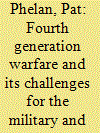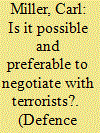|
|
|
Sort Order |
|
|
|
Items / Page
|
|
|
|
|
|
|
| Srl | Item |
| 1 |
ID:
103897


|
|
|
|
|
| Publication |
2011.
|
| Summary/Abstract |
This paper argues, primarily based on literature surveys, that warfare has changed fundamentally, and that the concept of Fourth Generation Warfare is an acceptable descriptor of the evolving potential of that change. This is a war in which the military instrument alone has very limited, but nonetheless essential, utility. This is not just a 'war amongst the people'; it is a war of the people. The global pursuit and ruthless defeat of the enemy centre of gravity - his ability to communicate - is central to success. For 'the people' to assume their role in this 4GW, there is a pressing requirement for a paradigmatic shift in mindsets and the thrust of political dialogue.
|
|
|
|
|
|
|
|
|
|
|
|
|
|
|
|
| 2 |
ID:
103896


|
|
|
|
|
| Publication |
2011.
|
| Summary/Abstract |
This paper (derived from the author's dissertation) is written from an Israeli perspective and examines the Israeli political leadership's Grand Strategy and Defence policy and approach to the use of force in the 2009 Gaza Campaign. It examines whether the Israeli Asymmetrical Deterrence approach, as implemented in the Gaza Campaign, will lead to a new era of reconciliation in the Middle East, or whether the region on its way to another period of increased bloodshed. Drawing upon the geopolitical struggle in the region as well as analysing the challenges of Grand Strategy, the Nature of War, Deterrence and the so called idea of 'Victory,' in the contemporary Middle East, this paper sets out to demonstrate how an historic and strategic opportunity to achieve a stable and secure solution between Israel and the Palestinians has emerged. The aim, therefore, is to examine the Israeli strategic perceptions and the author's interpretations of the course of events in Gaza 2009, and as such is written from an Israeli point of view.
|
|
|
|
|
|
|
|
|
|
|
|
|
|
|
|
| 3 |
ID:
103899


|
|
|
|
|
| Publication |
2011.
|
| Summary/Abstract |
It has been a staple assumption that terrorists 'do not want a place at the table: they want to shatter the table'. Across policymakers, academia and a wider commentariat, this position - that negotiation with the 'new' Islamist terrorist actor is both impossible and, anyway, highly undesirable - is so commonplace that the question has scarcely been raised. But is it true? The article considers the five pillars on which the no-negotiation position rests. First, 'rationality': are terrorists pathologically mad or fanatical? Second, 'viability': are there common interests or is this a zero-sum game? Third, 'representation': can terrorists fit into a diplomatic system recognising representative parties? Fourth, 'legitimacy': can diplomacy, as a system of norms, conventions and practices be applied to agents who reject this system wholesale? Fifth, 'preferability': even if possible, is it either strategically or ethically right to do so? The case on this question should not be closed yet.
|
|
|
|
|
|
|
|
|
|
|
|
|
|
|
|
| 4 |
ID:
103898


|
|
|
|
|
| Publication |
2011.
|
| Summary/Abstract |
The military is heavily invested in digital training environments, but the efficacy of this training is rarely validated. A review of current practice shows that digital training environments are usually less burdensome than real-world training environments but can lead to negative training. Digital training environments are useful for training visual processing, attention management, fast-twitch responses, fine motor skills, and some higher-order competencies.
Digital training environments (in their current form) are inferior to real-world methods for training the bio-locomotive and non-deliberative adaptive skills that are most important in combat at the lowest echelons (individual, team, and squad, at least). Procurers and trainers should use these insights to better combine the advantages of both environments.
|
|
|
|
|
|
|
|
|
|
|
|
|
|
|
|
| 5 |
ID:
103893


|
|
|
|
|
| Publication |
2011.
|
| Summary/Abstract |
This article seeks to explain China's defence conversion programme. There are inherent structural difficulties encountered in the beating of swords into ploughshares. China sought to resolve problems associated with its defence-conversion programme with grand strategic planning involving concerted efforts from all three pillars of power -- the party, the state and the army. A review of the defence-conversion programme suggests that the role of the military can be extended to encompass non-traditional missions during peacetime in order to reduce the burden on the national economy of defence spending, not only by diversification out of defence production but also by integration of the armed forces into more development-oriented activities.
|
|
|
|
|
|
|
|
|
|
|
|
|
|
|
|
| 6 |
ID:
103895


|
|
|
|
|
| Publication |
2011.
|
| Summary/Abstract |
Since the publication of the UK's Strategic Defence Review in 1998, the Ministry of Defence has sought to make a contribution to conflict prevention and post-conflict recovery through a series of educational programmes, the aim of which has been to promote good governance and management of defence so that both national and global security are assured. Although these programmes are generally well received by the recipients, there has been little attempt on the part of the UK government to assess systematically what has been achieved and how. This paper asks the question: what does it take to generate a 'critical mass' for reform?
|
|
|
|
|
|
|
|
|
|
|
|
|
|
|
|
| 7 |
ID:
103894


|
|
|
|
|
| Publication |
2011.
|
| Summary/Abstract |
This paper describes the utility of Social Science and Management theory as tools for sense making and strategy building in a 'Jus Post Bellum' phase of war, Iraq 2005. It describes how these theories aided the design and implementation a new vision and strategy to build capacity and capability in Iraq's Ministry of Interior and its Police Service. The concept of Strategic Drift provided a discourse and logic for identifying and describing the situation. Emergent Strategy formed the basis of an argument to challenge a Deliberate Strategy that was stalled and contributing to a state of flux. Kotter's eight step change model was the inspiration and methodology for implementing the change, moving from the stalled Deliberate Strategy to the new Vision and Emergent Strategy. Social Science research methodology and methods were used to investigate Iraqi and Coalition constructs of identity through attitudinal preferences. The author drew on Cultural and Social Identity theory to examine the data from national and organisational perspectives developing 'Hierarchies of Loyalty' models. These provided invaluable insights into relationship management: notably the primacy of Honour and what this meant in an Iraqi Arab approach to security sector capacity building.
|
|
|
|
|
|
|
|
|
|
|
|
|
|
|
|
|
|
|
|
|